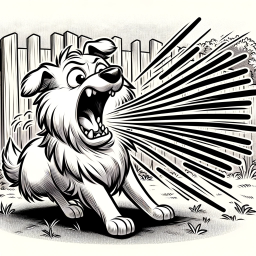Why Does My Dog Bark At Me When I Come Home? 4 reasons

Have you been wondering why your dog has been barking at you every time you come home? If so, then I’m sure you’re curious about your dog’s new habit, why your dog might be doing so, if it should be of concern, and how to get it to stop.
This post would help you better understand your dog’s behavior and would give you effective strategies to employ to help your dog drop the habit.
So, why does my dog bark at me when I come home?
Common reasons are your dog is being territorial about your home, your dog is trying to communicate a need, your dog is getting separation anxiety from being away from you, and also that it is a form of greeting or just your dog’s way of saying hello.
The key in finding out which of these reasons best apply to your dog is to read the situation that happens around such a habit and also to pay attention to your dog’s body language, as dogs have a limited vocal range and hence only a number of ways of expressing their feelings.
Hence, these two factors should give away the mood your dog is actually in.
Why Does My Dog Bark At Me When I Come Home?
4 Reasons why your dog barks at you when I arrive home
1. Your dog is hungry
Your dog might be barking at you the moment you come home because it’s hungry. This would most likely be the case if your dog skipped a mealtime. Every dog has its recommended daily calorie intake that is specific according to its breed, size, activity level, age, and overall health.
If your dog has taken less of that, then it’s most likely your dog is barking because it’s hungry.
Notice what your dog does as it barks at you.
Does your dog grab its feeding bowl?
Also, notice how your dog reacts when you finally feed it.
Does your dog get overly excited by the food?
If so, then this could be the source of your dog’s barking. To correct this, you can ensure your dog has enough to eat before leaving the house by placing extra food in his bowl to cover for the period you wouldn’t be home, or you can get a neighbor or friend to help feed your dog while you’re out.
2. Your dog is excited
It could be as a form of greeting. This might be a way of saying hello. Watch out for your dog’s body movements, are your dog’s tail raised high and waggy? Are your dog’s ears relaxed and floppy? And is your dog holding its body in a relaxed stance, running excitedly around while it barks at you? If so, then this might simply be a greeting and shouldn’t be something to be concerned of.
3. Your dog is anxious
Dogs that suffer from separation anxiety get anxious and stressed from being away from their owners. If your dog is suffering from separation anxiety, then it barking at you when you arrive might not be triggered by anything other than being left alone.
You can correct this by offering your dog lots of treats and toys just before you leave the house to keep him distracted and occupied while you’re out. You can also leave some of your clothes out for him to inhale your scent and feel safe.
Try ignoring your dog for a while when he barks as you arrive. This is to tone down on greetings so your dog wouldn’t make a big deal out of your going and coming. You can also get your dog natural calming supplements. If your dog doesn’t seem to get better after employing these strategies, then you might want to contact a dog behaviorist for professional assistance in treating an anxious dog.
4. Displaying territorial behavior
Dogs sometimes get territorial over people, places, and things, even towards their owners.
A territorial dog might get aggressive in guarding anything they believe is theirs, a toy, or even a space they consider their domain, in this case, your house.
You can tell if your dog is territorial about your home if it barks at you aggressively, growling, snapping, baring its teeth, lunging, or showing other signs of aggression.
There are so many reasons your dog might have decided to defend this space as its own such as your dog just having new puppies, genetics (as territorial behavior is normal in some breeds), bad socializing training as a puppy, your dog just recently reached maturity and environmental factors.
You can control your dog’s territorial aggression by avoiding situations that would bring on more aggressive reactions in your dog. You might also want to use a training program for your dog for safe and proper management strategies to help your dog.
Other reasons to consider
Your dog might be barking at you upon your arrival because it is thirsty, it isn’t comfortable in the house, perhaps the house has become too cold or too stuffy, or you have always encouraged the behavior by giving your dog treats and attention whenever it barks at you.
How to get your dog to stop barking at you when you arrive home

Getting your dog to drop a habit isn’t a day’s work; instead, it requires patience, consistency, and of course, love and understanding towards your pet.
Here are some things you shouldn’t do when trying to get your dog to stop barking at you
1. Don’t scream at your dog to keep quiet: This would only encourage the behavior as it would only make your dog feel like you’re barking along with him.
2. Don’t be inconsistent with your training method. Correcting your dog occasionally just won’t do it, as this might confuse your dog. Instead, you have to do so as regularly as your dog exhibits this bad behavior. (See the previous link above)
3. Don’t get frustrated. Getting frustrated would not only make things hard on you but also your dog. Remember that it is never your dog’s intention to make you unhappy.
Here are some strategies you can employ to stop the habit:
1. Positive reinforcement:
This would involve you offering your dog treats and attention when it stays quiet. You can do this by ignoring your dog while it’s barking when you come in, and the moment it stops barking, you shower him with gifts and your attention. Statements like “that’s a good boy,” ” well done,” in a soft, pleasing voice while you pet your dog would help your dog understand that you’d prefer it didn’t make so much noise.
2. Exercises and playtime:
Even though you can’t be home all day with your dog, ensure that you still have set periods when you engage him physically and mentally. Your dog might be barking at you because it has excess energy and isn’t allowed to dispense this energy, in which case taking your dog for regular walks should help.
Conclusion:
It is advisable to get your dog trained if you don’t know why your dog might be barking at you or if the habit hasn’t stopped even after employing corrective techniques.
Remember, some behavioral issues result from underlying medical conditions. Hence it’s always best to rule this out first. I hope you know the answer of this question: why does my dog bark at me when I come home?
Like it? Share it!
Related Articles:
Read More: Can Dogs Eat Carrot Cake? 6 Benefits
Read More: How to Clean a Dog Bed Without a Removable Cover? 6 Methods
Read More: Why is My Husky is So Fat? 5 Common Issues
Read More: Why Does My Dog Sit On Me? 12 Reasons
Read More: Why Does My Dog Put His Paw On My Face? 6 Reasons
Read More: How To Wash A Dog Without A Bathtub? 5 Effective Methods
Read More: Why Do Dogs Like Bolster Beds?
Read More: Why Does My Dog Smell My Ears? 3 Reasons





